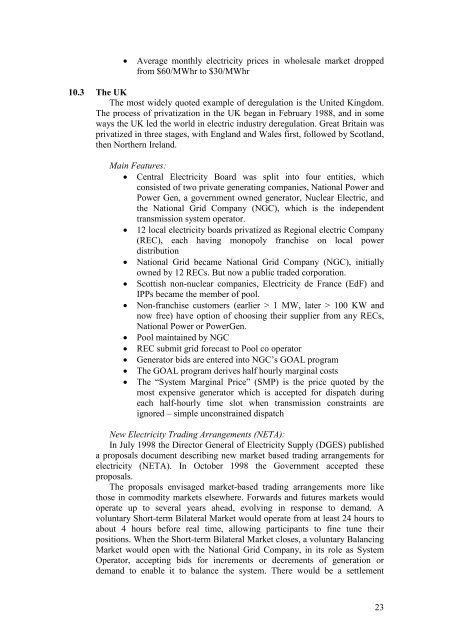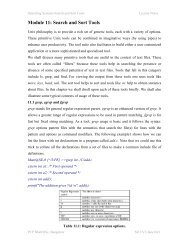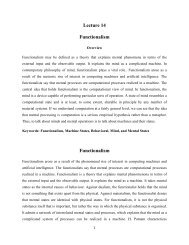Introduction to Deregulation in Power Industry - nptel
Introduction to Deregulation in Power Industry - nptel
Introduction to Deregulation in Power Industry - nptel
You also want an ePaper? Increase the reach of your titles
YUMPU automatically turns print PDFs into web optimized ePapers that Google loves.
• Average monthly electricity prices <strong>in</strong> wholesale market dropped<br />
from $60/MWhr <strong>to</strong> $30/MWhr<br />
10.3 The UK<br />
The most widely quoted example of deregulation is the United K<strong>in</strong>gdom.<br />
The process of privatization <strong>in</strong> the UK began <strong>in</strong> February 1988, and <strong>in</strong> some<br />
ways the UK led the world <strong>in</strong> electric <strong>in</strong>dustry deregulation. Great Brita<strong>in</strong> was<br />
privatized <strong>in</strong> three stages, with England and Wales first, followed by Scotland,<br />
then Northern Ireland.<br />
Ma<strong>in</strong> Features:<br />
• Central Electricity Board was split <strong>in</strong><strong>to</strong> four entities, which<br />
consisted of two private generat<strong>in</strong>g companies, National <strong>Power</strong> and<br />
<strong>Power</strong> Gen, a government owned genera<strong>to</strong>r, Nuclear Electric, and<br />
the National Grid Company (NGC), which is the <strong>in</strong>dependent<br />
transmission system opera<strong>to</strong>r.<br />
• 12 local electricity boards privatized as Regional electric Company<br />
(REC), each hav<strong>in</strong>g monopoly franchise on local power<br />
distribution<br />
• National Grid became National Grid Company (NGC), <strong>in</strong>itially<br />
owned by 12 RECs. But now a public traded corporation.<br />
• Scottish non-nuclear companies, Electricity de France (EdF) and<br />
IPPs became the member of pool.<br />
• Non-franchise cus<strong>to</strong>mers (earlier > 1 MW, later > 100 KW and<br />
now free) have option of choos<strong>in</strong>g their supplier from any RECs,<br />
National <strong>Power</strong> or <strong>Power</strong>Gen.<br />
• Pool ma<strong>in</strong>ta<strong>in</strong>ed by NGC<br />
• REC submit grid forecast <strong>to</strong> Pool co opera<strong>to</strong>r<br />
• Genera<strong>to</strong>r bids are entered <strong>in</strong><strong>to</strong> NGC’s GOAL program<br />
• The GOAL program derives half hourly marg<strong>in</strong>al costs<br />
• The “System Marg<strong>in</strong>al Price” (SMP) is the price quoted by the<br />
most expensive genera<strong>to</strong>r which is accepted for dispatch dur<strong>in</strong>g<br />
each half-hourly time slot when transmission constra<strong>in</strong>ts are<br />
ignored – simple unconstra<strong>in</strong>ed dispatch<br />
New Electricity Trad<strong>in</strong>g Arrangements (NETA):<br />
In July 1998 the Direc<strong>to</strong>r General of Electricity Supply (DGES) published<br />
a proposals document describ<strong>in</strong>g new market based trad<strong>in</strong>g arrangements for<br />
electricity (NETA). In Oc<strong>to</strong>ber 1998 the Government accepted these<br />
proposals.<br />
The proposals envisaged market-based trad<strong>in</strong>g arrangements more like<br />
those <strong>in</strong> commodity markets elsewhere. Forwards and futures markets would<br />
operate up <strong>to</strong> several years ahead, evolv<strong>in</strong>g <strong>in</strong> response <strong>to</strong> demand. A<br />
voluntary Short-term Bilateral Market would operate from at least 24 hours <strong>to</strong><br />
about 4 hours before real time, allow<strong>in</strong>g participants <strong>to</strong> f<strong>in</strong>e tune their<br />
positions. When the Short-term Bilateral Market closes, a voluntary Balanc<strong>in</strong>g<br />
Market would open with the National Grid Company, <strong>in</strong> its role as System<br />
Opera<strong>to</strong>r, accept<strong>in</strong>g bids for <strong>in</strong>crements or decrements of generation or<br />
demand <strong>to</strong> enable it <strong>to</strong> balance the system. There would be a settlement<br />
23
















